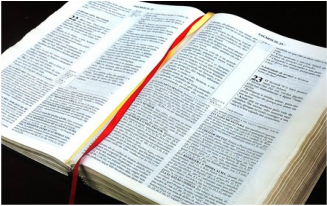Jeremiah Chapter 33 Lessons from the textOverly Blessed God tells Jeremiah that He will reveal great and mighty things which Jeremiah does not know. The thought is that what God has in store for Israel is beyond Jeremiah’s ability to understand. Elsewhere, God says that “since the beginning of the world men have not heard, nor perceived by the ear, neither hath the eye seen, O God, beside thee, what he hath prepared for him that waiteth for him” (Isa. 64). God’s goodness, especially when we are in the middle of turmoil, is difficult for us to understand. He wishes to bless us so completely that it goes beyond our wildest imagination. After all, how could God store up so much good for us who have chosen again and again to pursue wickedness? How many times have we failed to live up to God’s standards? Yet, when we repent and come back to God, God promises to pour out a blessing that we cannot contain. He is truly a great and mighty God. Verse by Verse Commentary 1-8 Now that Jerusalem is beginning to fall apart, God changes His message to the Jews. He was before warning of the impending destruction if the people continued to pursue sin. Now, He focuses on a promise of restoration. God is giving hope to His people. Even though the judgment they are enduring is brought about by their own refusal to repent, God is gracious enough to give them hope and an escape from their troubles. After their judgment is complete, God will once again be able to pardon their iniquities and dwell among them. Noteworthy is that God is doing everything He can to be able to have fellowship with His people; even judgment is a means of cleansing the people of their sins so that they may receive forgiveness. 9-10 Even though Jeremiah has been prophesying at God’s command concerning the desolation that will come to Judah, God is now saying that the name “Judah” will become a name of great joy (Jer. 25:11). Not only will the land be a delight to God but also all the nations of the earth will give it praise and honor. 11 God will turn the sorrow of the Jews into joy. Noteworthy is that instead of animal sacrifice, God mentions the sacrifice of praise. While the sacrificial laws are required for the forgiveness of sin, God is far more interested in the sacrifices of the heart. He wants His people to have a perfect heart, full of righteousness, justice, and devotion to God. 12-14 Under the original covenant with Israel, God promised a land of blessing which flows with milk and honey (Exo. 3:17). God will be able to perform this promise after Israel has been restored from its sin. 15-16 On “branch” see Jeremiah 23:5 and Isaiah 11:1-5. The Messiah is promised to come when Israel has been restored to its land. He will rule in righteousness. This can be interpreted two ways. First, through His righteousness, salvation will be made available to the Jews and all the nations. In this sense, He executes judgment and righteousness in individual’s spirits through the spiritual kingdom of God (Lk. 17:20-21). Second, He will return in person to rule in Jerusalem in a literal kingdom of God (Isa. 24:23, Rev. 20:4). Noteworthy is that when salvation comes, Jerusalem will be known by the name of the Lord. 17-18 The “Branch”, the Messiah, is from the line of David. While this verse could mean that from the Messiah will be a continual line of kings and priests, this interpretation is voided by the fact that there is neither a king nor high priest from the line of David in Jerusalem at present. Jesus, however, satisfies both these requirements. By possessing eternal life, He sits continually as King of Jerusalem (in heaven at present and in Jerusalem in the future) and is the High Priest before God the Father, making intercession on behalf of the saints. The point is that Messiah satisfies the requirements of God’s promise to King David and the requirements of the high priest under the Mosaic Law (II Sam. 7:12-16). God is therefore promising to the Jews that they will have an eternal king who will also be the high priest. 19-26 Reminiscent of Jeremiah 32:35-37, God invokes the inability to break His covenant as proof that He will not fail to perform all the words which He has spoken concerning David and the Levites. See II Samuel 7:12-16 and Deuteronomy 10:8-9. The people demonstrate a lack of faith in God; they did not listen when God forewarned of the coming invasion, and they now show doubt that they will survive despite God’s promise of restoration. ___________________ Thank you for your faithfulness in studying God’s word. Please comment below to share what you learned from today's lesson.
0 Comments
Leave a Reply. |
Devotional Categories
All
Archives
September 2023
|
|
Join my mailing list!
|
Thank you!You have successfully joined our subscriber list. |
|
© 2024 Melissa Beaty
|
